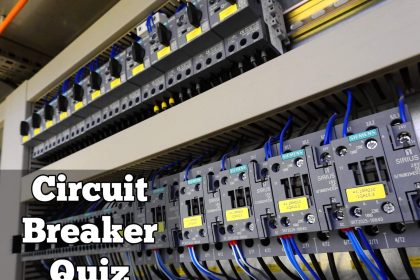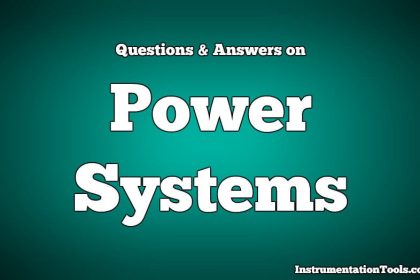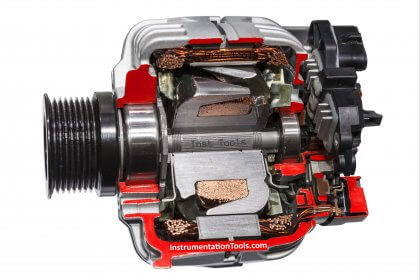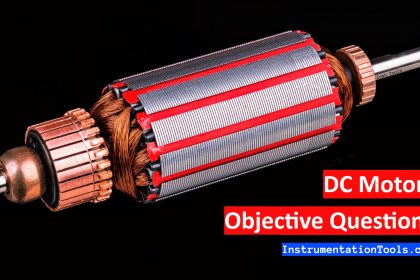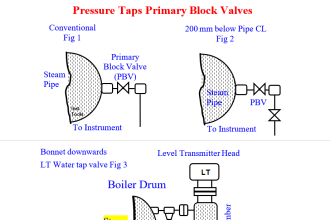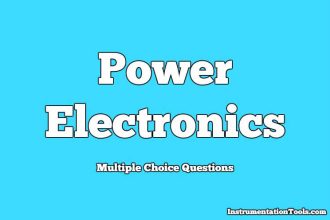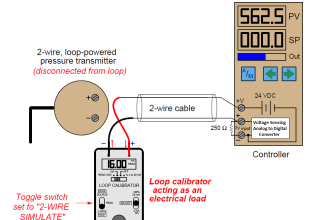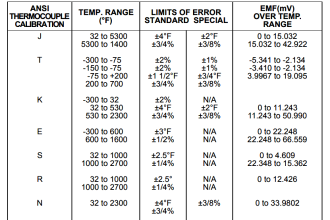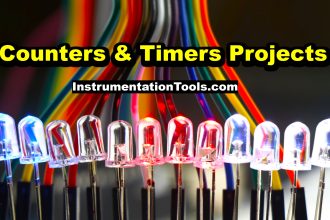Understand the miniature circuit breakers with our detailed MCQ questions and answers for electrical engineers and electricians.
Miniature Circuit Breakers
This below video provides the detailed explanations for the MCB questions and answers.
Question 1
What does MCB stand for in electrical systems?
A. Main Circuit Breaker
B. Modular Circuit Breaker
C. Miniature Circuit Breaker
D. Micro Circuit Breaker
Show the Answer
Miniature Circuit Breaker
Question 2
Which of the following is a primary advantage of using MCBs over fuses?
A. Easier reset after tripping
B. Higher current rating
C. Faster response time
D. Lower cost
Show the Answer
Easier reset after tripping
Question 3
Which component inside an MCB ensures it trips during a short circuit?
A. Arc chute
B. Bimetal strip
C. Thermal sensor
D. Electromagnetic coil
Show the Answer
Electromagnetic coil
Question 4
What is the main purpose of an MCB’s arc chute?
A. To trip the circuit
B. To cool and extinguish the arc
C. To detect overcurrent
D. To measure current
Show the Answer
To cool and extinguish the arc
Question 5
How do MCBs generally trip in case of an overload condition?
A. Mechanical failure
B. Electromagnetic mechanism
C. Manual operation
D. Thermal mechanism
Show the Answer
Thermal mechanism
Question 6
What is a Miniature Circuit Breaker (MCB)?
A. A device for overcurrent protection
B. A device for surge protection
C. A switch for turning off lights
D. A device for detecting ground faults
Show the Answer
A device for overcurrent protection
Question 7
What is a Residual Current Circuit Breaker (RCCB)?
A. A device for regulating voltage levels
B. A device for controlling power supply
C. A device for detecting earth leakage faults
D. A device for protecting against surges
Show the Answer
A device for detecting earth leakage faults
Question 8
What is a Residual Current Circuit Breaker with Overcurrent Protection (RCBO)?
A. A device that only protects against overcurrent
B. A device for voltage regulation
C. A device for frequency modulation
D. A device combining overcurrent and residual current protection
Show the Answer
A device combining overcurrent and residual current protection
Question 9
What is an Air Circuit Breaker (ACB)?
A. A breaker used in low voltage circuits
B. A breaker used for high current interruptions
C. A device for detecting ground faults
D. A breaker for surge protection
Show the Answer
A breaker used for high current interruptions
Question 10
What is a Molded Case Circuit Breaker (MCCB)?
A. A device for voltage regulation
B. A breaker with adjustable trip settings for overcurrent
C. A device for detecting high-frequency noise
D. A breaker that automatically resets
Show the Answer
A breaker with adjustable trip settings for overcurrent
Question 11
What is an Earth Leakage Circuit Breaker (ELCB)?
A. A device for detecting ground faults and cutting off power
B. A device for frequency regulation
C. A device for protecting against voltage surges
D. A device for detecting phase imbalances
Show the Answer
A device for detecting ground faults and cutting off power
Question 12
What is a Motor Protection Circuit Breaker (MPCB)?
A. A breaker that only protects against short circuits
B. A breaker for frequency modulation
C. A breaker that includes overload and phase failure protection
D. A breaker for detecting voltage surges
Show the Answer
A breaker that includes overload and phase failure protection
Question 13
What is a Supplementary Protector (SP)?
A. A device for detecting ground faults
B. A primary protection device for high-voltage circuits
C. A device offering backup protection for control circuits
D. A device for voltage regulation
Show the Answer
A device offering backup protection for control circuits
Question 14
What is a Shunt Trip Circuit Breaker?
A. A breaker that automatically resets
B. A breaker for voltage regulation
C. A breaker that can be tripped remotely
D. A breaker for detecting phase imbalances
Show the Answer
A breaker that can be tripped remotely
Question 15
What is an Earth Fault Relay (EFR)?
A. A device for balancing three-phase loads
B. A relay for voltage regulation
C. A device for detecting and isolating voltage surges
D. A relay for monitoring earth fault currents and tripping the circuit
Show the Answer
A relay for monitoring earth fault currents and tripping the circuit
Question 16
What is a Ground Fault Circuit Interrupter (GFCI)?
A. A device for voltage regulation
B. A device for protecting against high-frequency interference
C. A device for detecting and interrupting ground faults
D. A device for balancing the load between phases
Show the Answer
A device for detecting and interrupting ground faults
Question 17
What is an Arc Fault Circuit Interrupter (AFCI)?
A. A device for overcurrent protection
B. A device for detecting and interrupting arc faults
C. A device for ground fault protection
D. A device for protecting against voltage surges
Show the Answer
A device for detecting and interrupting arc faults
Question 18
What is a Type B MCB?
A. A breaker for general lighting and outlet circuits
B. A breaker for circuits with high inrush currents
C. A breaker for protecting sensitive electronic devices
D. A breaker for industrial motor protection
Show the Answer
A breaker for general lighting and outlet circuits
Question 19
What is a Type C MCB?
A. A breaker with a lower operating voltage
B. A breaker with a higher trip threshold than Type B
C. A breaker with built-in surge protection
D. A breaker with a faster response time
Show the Answer
A breaker with a higher trip threshold than Type B
Question 20
What is a Type D MCB?
A. A breaker for circuits with very high inrush currents
B. A breaker for low voltage lighting
C. A breaker for general household wiring
D. A breaker for earth leakage protection
Show the Answer
A breaker for circuits with very high inrush currents
Question 21
What is a Type K MCB?
A. A breaker for circuits with inductive loads
B. A breaker for low voltage residential circuits
C. A breaker for HVAC systems
D. A breaker for high precision electronic devices
Show the Answer
A breaker for circuits with inductive loads
Question 22
What is a Type Z MCB?
A. A breaker for high inrush current circuits
B. A breaker with built-in voltage regulation
C. A breaker for general lighting and outlet protection
D. A breaker extremely sensitive to low current faults
Show the Answer
A breaker extremely sensitive to low current faults
Question 23
What is a Type A MCB?
A. A breaker for low voltage lighting circuits
B. A breaker for mixed load circuits with moderate inrush current
C. A breaker for circuits with only resistive loads
D. A breaker for high inrush current circuits
Show the Answer
A breaker for mixed load circuits with moderate inrush current
Question 24
What is the typical trip rating for a Type B MCB?
A. 5-10 times rated current
B. 3-5 times rated current
C. 1-2 times rated current
D. 10-20 times rated current
Show the Answer
3-5 times rated current
Question 25
How does a Type C MCB differ in trip rating from a Type B MCB?
A. Trips at 5-10 times rated current
B. Trips at 1-2 times rated current
C. Trips at 3-5 times rated current
D. Trips at 10-20 times rated current
Show the Answer
Trips at 5-10 times rated current
Question 26
What trip rating is associated with a Type D MCB?
A. 10-20 times rated current
B. 3-5 times rated current
C. 5-10 times rated current
D. 1-2 times rated current
Show the Answer
10-20 times rated current
Question 27
What trip rating does a Type K MCB have?
A. 10-20 times rated current
B. 2-3 times rated current
C. 3-5 times rated current
D. 8-12 times rated current
Show the Answer
8-12 times rated current
Question 28
What is the trip rating for a Type Z MCB?
A. 5-10 times rated current
B. 2-3 times rated current
C. 3-5 times rated current
D. 10-20 times rated current
Show the Answer
2-3 times rated current
Question 29
What does the breaking capacity of an MCB indicate?
A. Maximum resistance it can provide
B. Maximum current it can interrupt safely
C. Maximum power it can manage
D. Maximum voltage it can handle
Show the Answer
Maximum current it can interrupt safely
Question 30
Why is it important to select the correct type of MCB for different applications?
A. To comply with building codes
B. To ensure proper protection
C. To reduce electricity bills
D. To match the circuit’s color
Show the Answer
To ensure proper protection
Question 31
What feature of MCBs makes them more user-friendly compared to traditional fuses?
A. Higher durability
B. Smaller size
C. Lower cost
D. Visual indication of status
Show the Answer
Visual indication of status
Question 32
In an MCB, what function does the bimetallic strip perform?
A. Measures current
B. Cools the circuit
C. Indicates circuit status
D. Trips during overload
Show the Answer
Trips during overload
Question 33
Which type of MCB is commonly used in industrial applications due to its high breaking capacity?
A. Type C
B. Type B
C. Type D
D. Type K
Show the Answer
Type C
Question 34
What does the term ‘tripping curve’ refer to in MCB specifications?
A. The voltage rating
B. The physical shape of the MCB
C. The MCB’s response to different currents
D. The installation method
Show the Answer
The MCB’s response to different currents
Question 35
Which feature of an MCB helps in preventing electrical fires?
A. High current rating
B. Rapid tripping mechanism
C. Compact size
D. Adjustable settings
Show the Answer
Rapid tripping mechanism
Question 36
In which scenario would a Type K MCB be most appropriately used?
A. Domestic lighting
B. Inductive loads with high inrush
C. Sensitive electronics
D. Low power circuits
Show the Answer
Inductive loads with high inrush
Question 37
How does an MCB contribute to the safety of an electrical system?
A. By enhancing signal strength
B. By monitoring voltage fluctuations
C. By automatically disconnecting faulty circuits
D. By lowering electricity costs
Show the Answer
By automatically disconnecting faulty circuits
Question 38
What type of MCB would be selected for a circuit with predominantly resistive loads?
A. Type B
B. Type D
C. Type C
D. Type A
Show the Answer
Type B
Question 39
What is the tripping characteristic of an MCB that is used for general lighting circuits?
A. Type C
B. Type D
C. Type B
D. Type K
Show the Answer
Type B
Question 40
Which type of MCB is best suited for protecting circuits with high inrush currents, like motors?
A. Type D
B. Type B
C. Type C
D. Type A
Show the Answer
Type D
Read Next:
- Components of MCB Questions
- MCB Nameplate Questions and Answers
- MCB vs Fuse Questions and Answers
- Industrial Automation Acronyms Questions
- Electrician Tools MCQ Questions

